- About Ramapo
- Academics
- Admissions & Aid
- Student Life
- Athletics
- Alumni
- Arts & Community
- Quick Links
- Apply
- Visit
- Give
News / Events
May 23, 2025Road Trip To Yale
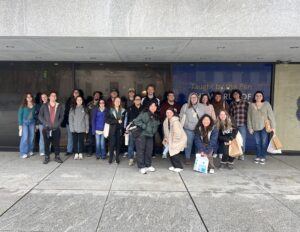
Students visit museum and libraries on the Yale campus.
On Saturday, April 5, Professors Sarah Koenig and Stephen Rice traveled with a group of students to New Haven, Connecticut to visit several museums on the Yale University campus. The group included members of the History Club as well as students in Professor Koenig’s American West class and Professor Rice’s Museums in America and Honors Studies in Arts and Humanities classes. Highlights were a tour of the Beinecke Rare Book and Manuscript Library and visits to the Yale Peabody Museum and the Yale University Art Gallery. Everyone had a chance, too, to sample New Haven’s great food options and take in other sites around campus. Thank you goes to Dean Susan Hangen for providing Platinum Funding for the bus. It was a soggy spring day and lots of fun, and we look forward to more trips like this in the future. Pictured here are the students gathered in front of the Beinecke Library.
April 17, 2025Congratulations to Our Scholars Day Students!
- Miranda Trautman and Professor Paula Straile-Cohen
- Professor Ed Shannon and Amanda Drexler
- Cathy Moran Hajo and Michelle Kukan
Scholars’ Day is an annual event held near the end of each spring semester that serves as an opportunity for the entire community to celebrate our students’ creative and scholarly achievements. Sponsored by the Office of the Provost, Scholars’ Day showcases some of the most exemplary faculty-mentored student creativity and scholarly activities undertaken in 2024-25. A juried event, Scholars’ Day features poster and oral presentations that represent the support of the convening groups of the majors or minors associated with the projects and the dedication of faculty mentors. HGS had a great showing! We would like to congratulate Miranda Trautman, Erin Pryor, Elizabeth Marroquin, Marina Gannon, Elly Raisch, Stefanie Viera, Antonio Russo, Rachel Chandler, Michelle Kukan, Amanda Drexler, Sarah Glisson, Luke DiMascio, Maddisyn Vaccaro, Sophia Kopreski, Lena Mardini, and Alan Rosenberg who participated this year. Michelle Kukan was selected by Dean Hangen for the HGS oral presentation of research on the Jane Addams Papers and Artificial Intelligence.
February 28, 2025Congratulations to Hannah Steinlauf!
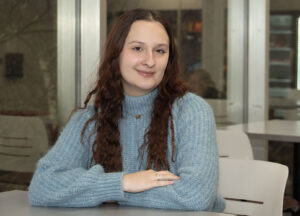
Hannah Steinlauf (’25)
Congratulations to third year senior Hannah Steinlauf (’25) with a major in History and a minor in Museum and Exhibition Studies who has just committed to Trinity College Dublin for a master’s in Public History and Cultural Heritage. While choosing between multiple graduate acceptances, Hannah picked Trinity because it gave her the opportunity to focus on museum accessibility in the very country she studied abroad in in Fall 2023. Her undergraduate internship with Wayne Museum and work with the Jane Addams Papers Project has inspired her passion for the importance of the digital humanities and making history and museums accessible, which she intends to pursue in her postgraduate studies.
February 27, 2025Congratulations to Elly Raisch!
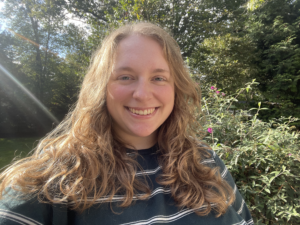
Elly Raisch (’25)
Congratulations to Senior International Studies major Elly Raisch (‘25) who was accepted to Simmons University’s graduate program for Library and Information Science. Elly initially became interested in library work through her experiences working at Ramapo’s Center for Reading and Writing and the Digital Humanities Center’s Penny Colman Project. These opportunities helped foster her passion for service and information organization, leading her to pursue a path towards public librarianship in the hopes of supporting free access to media and public resources.
November 12, 2024Sarah Koenig Presents on Wild West in New Jersey at the Mahwah Museum
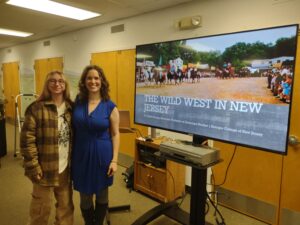
Sarah Koenig and Maddisyn Vaccaro at the Museum, November 10, 2024.
American Studies Professor Sarah Koenig presented student work in her American West course to an audience at the Mahwah Museum. Accompanied by Ramapo senior Maddisyn Vaccaro. Dr. Koenig’s talk, The Wild West in New Jersey, looks at the Garden State’s contribution to both the development of the West (Stetson hats, the Paterson Colt Revolver) and to the myth of the West (Thomas Edison’s early films). Maddisyn discussed her research for the class of a film studio that made Westerns in New Jersey’s Pine Barrens, explaining how she had to dig deep into historical resources to document it.
November 4, 2024Ramapo Students Attend Northwest Bergen History Coalition Luncheon
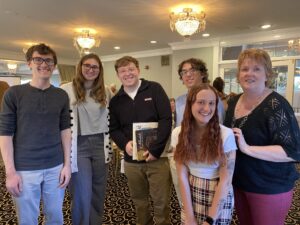
Christopher Flug, Michelle Kukan, Alexander Samieske, Alan Rosenberg, Hannah Steinlauf and Cathy Hajo at the luncheon.
The Northwest Bergen History Coalition is an organization of twelve local history museums that work together to promote local history research. Many of its members offer internships to Ramapo College students. The coalition hosted five students at its recent luncheon on November 1. Christopher Flug (American Studies major), Michelle Kukan, Alexander Samieske, Alan Rosenberg, and Hannah Steinlauf (all History majors) helped with registration and book sales.
Speakers included Cynthia Forster of the Bergen County Division of Cultural and Historical Affairs discuss plans for Bergen 250, an initiative to celebrate the upcoming anniversary of the American Revolution and provide information on opportunities for volunteer work and internships. The main speaker at the luncheon was Jim Wright, a local historian and journalist. He spoke on The Turncoat and the Patriot, an exploration of John Fell and William Franklin’s different paths during the Revolution. All attendees received a copy of Wright’s children’s book, The Ghosts of Allendale.
October 8, 2024Critical Reading & Writing SI Sections
Critical Reading and Writing offers sections of CRWT 102 with supplemental instruction for students who tested into CRWT 101S. “Supplemental instruction” refers to an internationally recognized set of teaching practices aimed at strengthening undergraduate students’ reading, writing, and research skills.
If you tested into 101S, please register for 102S to continue to receive the instructional support the college has provided to support your continued success at Ramapo.
For more information contact success@ramapo.edu or hgs@ramapo.edu
May 3, 2024Dean Chen's Quick Take on US-Korea-China-Taiwan Relations
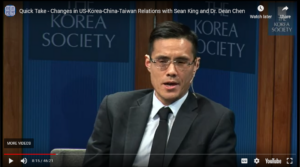 Professor of Political Science Dean Chen participated in a talk along with Sean King on May 2 at the Korea Society, discussing Given heightened tensions and strategic competition in the Indo Pacific, how is South Korea navigating its diplomatic, economic, and security relationships with the US, China, and Taiwan? In a 2023 Joint Statement, US President Joseph Biden and South Korean President Yoon Suk Yeol “reiterated the importance of preserving peace and stability in the Taiwan Strait [and] strongly opposed any unilateral attempts to change the status quo in the Indo-Pacific…” thereby underscoring an uptick in Korean interest and attention to the Taiwan question.
Professor of Political Science Dean Chen participated in a talk along with Sean King on May 2 at the Korea Society, discussing Given heightened tensions and strategic competition in the Indo Pacific, how is South Korea navigating its diplomatic, economic, and security relationships with the US, China, and Taiwan? In a 2023 Joint Statement, US President Joseph Biden and South Korean President Yoon Suk Yeol “reiterated the importance of preserving peace and stability in the Taiwan Strait [and] strongly opposed any unilateral attempts to change the status quo in the Indo-Pacific…” thereby underscoring an uptick in Korean interest and attention to the Taiwan question.
Watch the fascinating discussion here!
April 30, 2024Japanese Language and Culture Study Awards go to Three RCNJ Students!
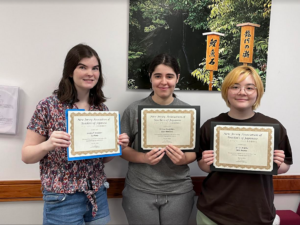
CJ Fisher, Emily Markuske and Gene Anerine with their awards.
Congratulations to Gene Anerine, CJ Fisher, and Emily Markuske, three students who studied with Ramapo Adjunct Professor of Japanese Kei Sakayama. The students, who tool Japanese Foundation II were recently honored with 2024 NJATJ Japanese Language and Culture Study Awards. These awards are presented by the New Jersey Association of Teachers of Japanese, which recognizes selected students from New Jersey high schools and colleges for their achievements, efforts and interests in learning the Japanese language and culture.
March 25, 2024Miranda Trautmann Featured Tonight in National Showcase on Sharing Stories from 1977
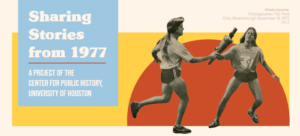 Professor Stacie Taranto reports that history major Miranda Trautmann will be participating in a national showcase for work she did in a digital history project last semester. The Sharing Stories from 1977 project will host its first annual student showcase on Monday March 25, 7-8 pm central online. Miranda is one of seventeen students selected to show their work which features biographical research done on members of the 1977 National Women’s Conference. This nationwide project seeks to uncover the stories of all 2,000 participants in the Conference in time for its fiftieth anniversary in 2027.
Professor Stacie Taranto reports that history major Miranda Trautmann will be participating in a national showcase for work she did in a digital history project last semester. The Sharing Stories from 1977 project will host its first annual student showcase on Monday March 25, 7-8 pm central online. Miranda is one of seventeen students selected to show their work which features biographical research done on members of the 1977 National Women’s Conference. This nationwide project seeks to uncover the stories of all 2,000 participants in the Conference in time for its fiftieth anniversary in 2027.
You can watch via Zoom by registering here: https://www.eventbrite.com/e/sharing-stories-student-showcase-tickets-848447087077
Copyright ©2025 Ramapo College Of New Jersey. Statements And Policies. Contact Webmaster.
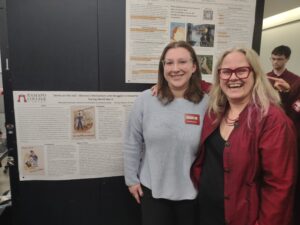
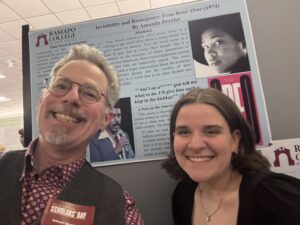
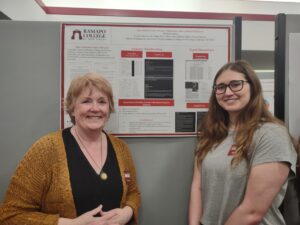

Follow Ramapo